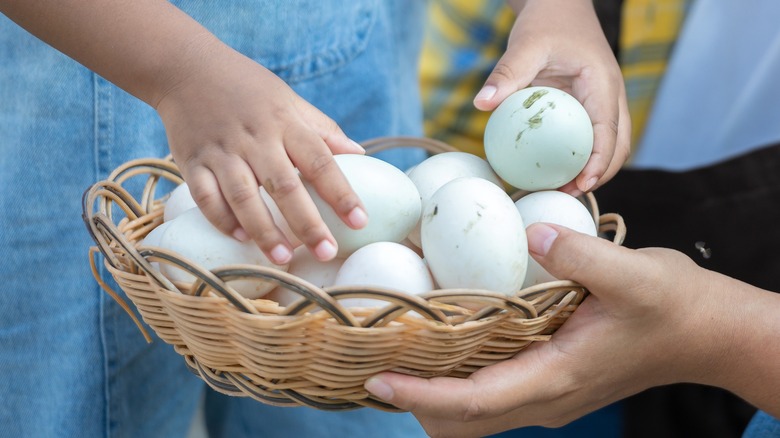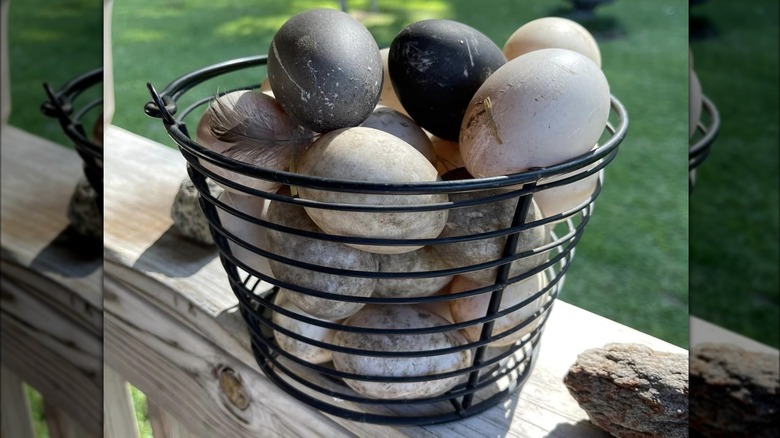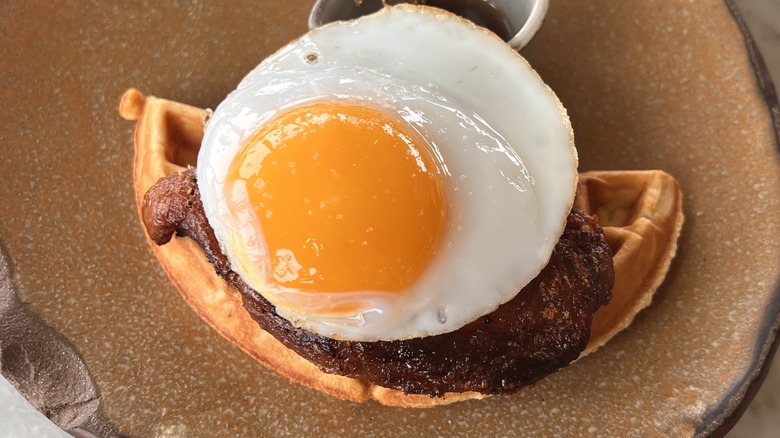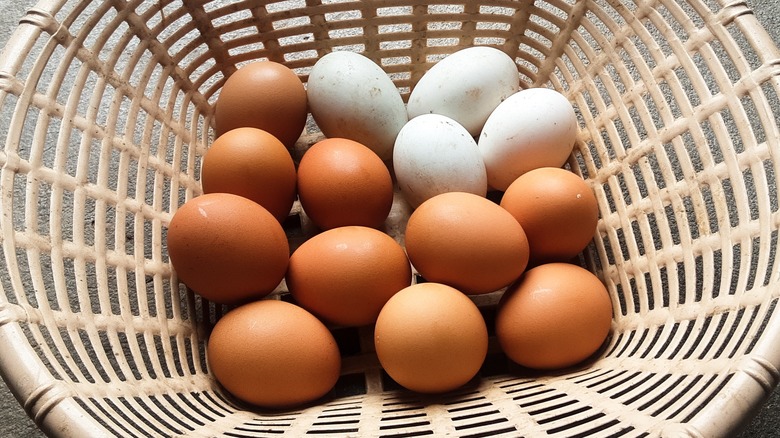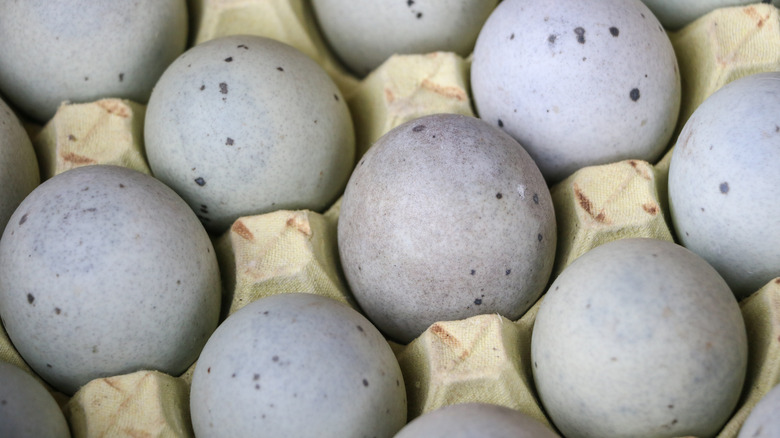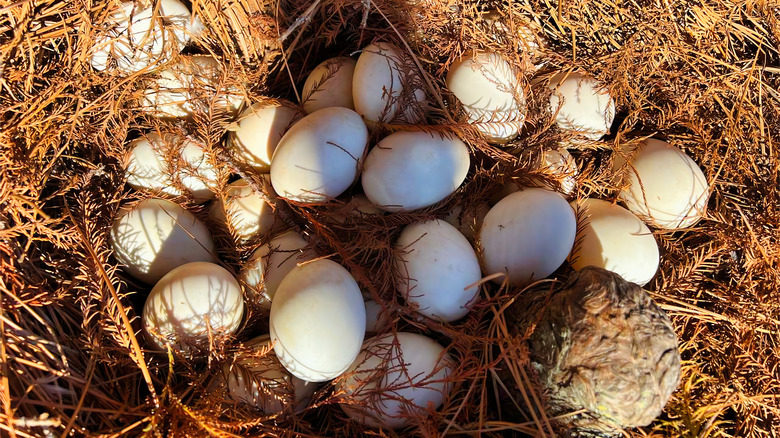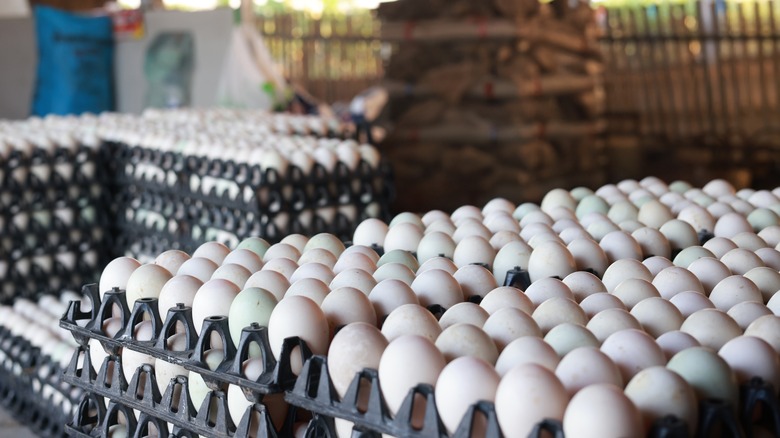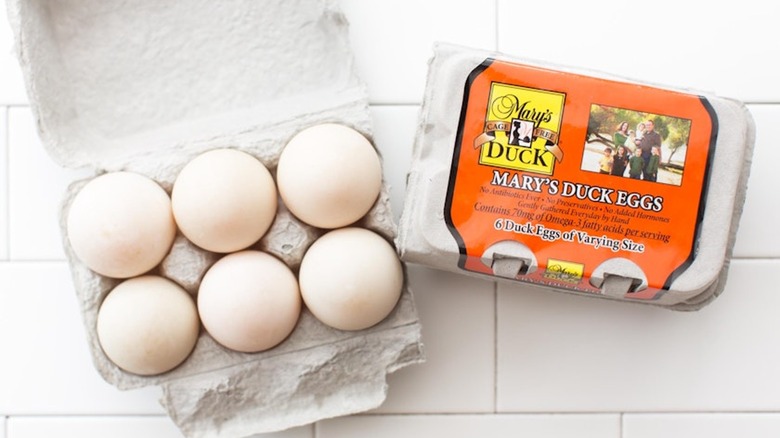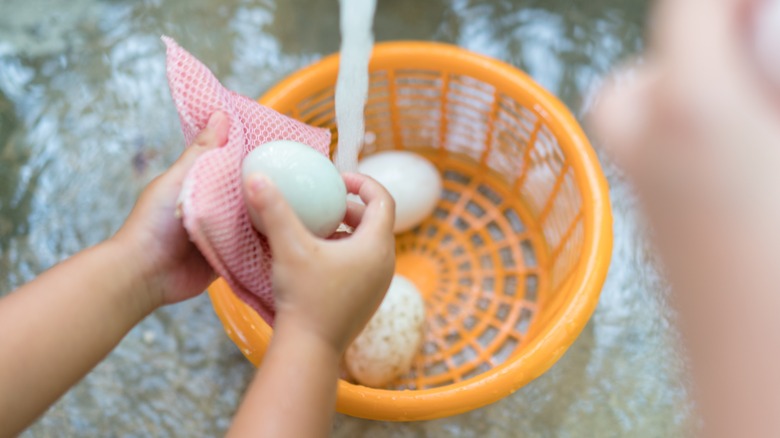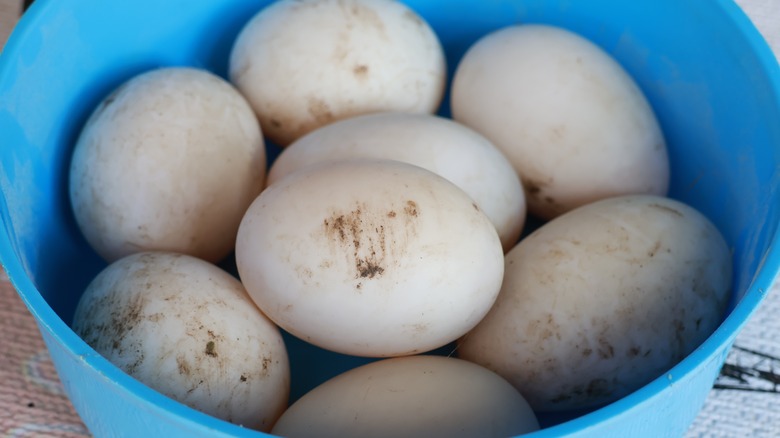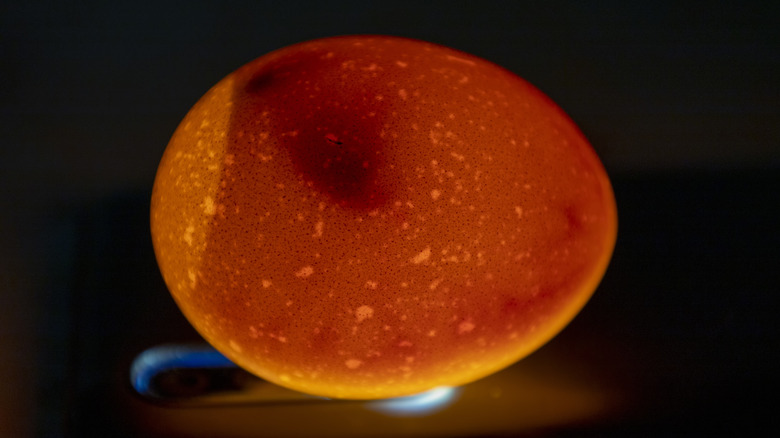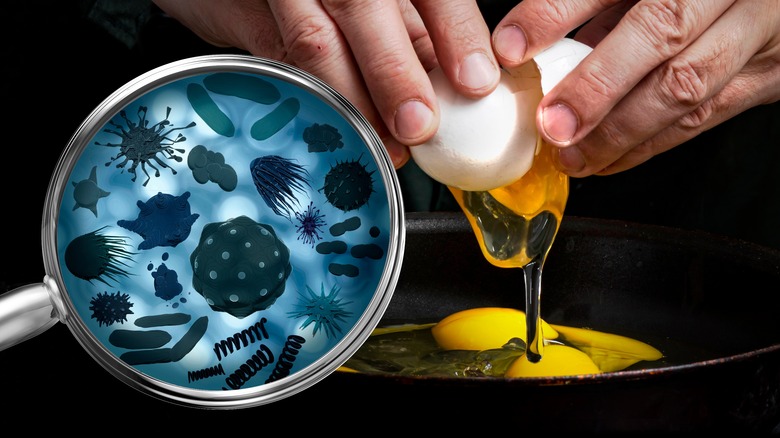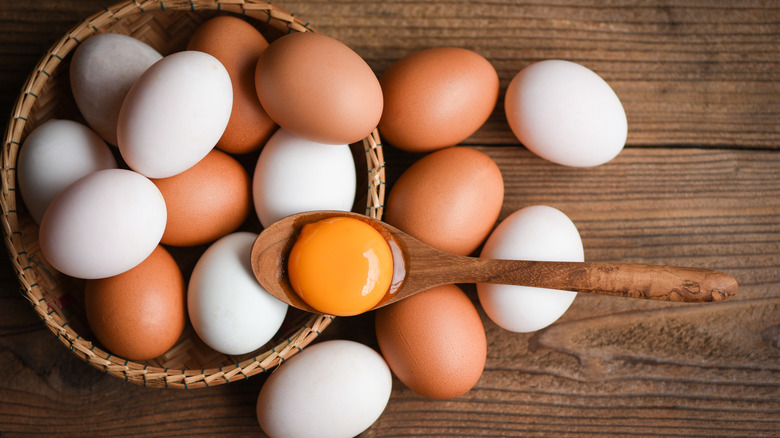Everything You Need To Know About Duck Eggs, According To Farmers
If you've ever passed up duck eggs because you didn't know what to do with them or if you'd like them, our guide to duck eggs should eliminate a lot of your questions. Once you've tried these amazing eggs in the right recipe, you're likely to want to seek them out again.
There's a lot to know about duck eggs. We've covered what they look and taste like, information about finding and buying them, and how to clean and store these eggs. You'll also learn how they compare to chicken eggs and how you can use them as a substitute in a chicken egg recipe. Plus, we'll explain how people usually like to use them.
For more insight into the world of duck eggs, we turned to experts. One expert who provided a great deal of information is the General Manager of Delta Farm in Newcastle, California, Rachel Cubreth. Duck farmer Marc Metzer of Metzer Farms in Gonzales, California, was also invaluable to our research. The information we provide and their expert insight can help introduce you to the world of duck eggs, so you can learn to enjoy them to their fullest.
What duck eggs look like
Duck eggs look a lot like chicken eggs, except that they're generally larger in size and come in colors you might not have seen on chicken eggs. The color of a duck egg depends on the duck's breed and genetics. However, environment and diet matter, too. Some duck egg shells come in colors reminiscent of chicken eggs. Marc Metzer says, "Some of our breeds have a high percentage of green eggshells, but overall most breeds lay a white egg." Other colors include cream, brown, blue, and grey. Metzer told us that Cayuga ducks have dark eggs that range all the way to completely black.
Metzer notes that "larger breeds lay larger eggs." For example, his Jumbo Pekin Ducks weigh 9 to 13.5 pounds, and his Pekin Grimaud Hybrid Ducks weigh 8 to 12.25 pounds, and they both lay eggs that weigh 3.2 to 3.5 ounces. Meanwhile, his smaller ducks like Mallards only weigh 2.25 to 2.5 pounds and lay eggs that are only 2.3 to 2.6 ounces.
What duck eggs taste like
Many people compare the flavor of duck eggs to chicken eggs. Marc Metzer explains the flavor as being, "Richer and more flavorful than chicken eggs. A higher percentage of the egg is yolk, so you get more of that creamy texture and more savory taste with a hint of umami."
Metzer says that, "Overall, a duck egg is more eggy than a chicken egg." So, you might steer clear of using them in recipes where you don't want an eggier flavor. When people describe the flavor as being richer than chicken eggs, some say it's akin to the difference between drinking full-fat whole milk and milk that's had some of the fat removed. The extra fat in the eggs just makes them taste richer and more lush.
Rachel Cubreth told us that "[t]he flavor is highly impacted by the feed the bird is provided. ... A well-fed bird will result in a better-quality egg." Delta Farm has a high-quality proprietary feed that all its producers use to ensure taste quality. She also says that being free range can affect the flavor of the bird as well. So, if you want to experience a superior duck egg, it pays to know what they're eating and if they're free-range ducks.
How duck eggs are similar to and different from chicken eggs
Like chicken eggs, duck eggs vary in size. A smaller one could be equivalent in size to a regular-sized chicken eggs. Whereas, a larger one might be as big as two regular-sized chicken eggs. Even the average jumbo chicken eggs only weigh in at 2.5 ounces, which would be like Metzer Farms' smallest Mallard duck eggs. Meanwhile, Metzer Farms' largest duck eggs are an ounce larger than a jumbo chicken egg.
If the farmer you get the eggs from hasn't washed them, they will have a protective bloom on them that is waxier than the bloom on chicken eggs. The shell is also thicker than a chicken egg, which means you'll need to hit it a little harder to get it to crack open. Inside, you'll find that the egg white is more transparent, stickier, and firmer than chicken eggs. They're also more difficult to beat into foam.
The yolk is larger and often darker and closer to orange than chicken eggs. The more Xanthophylls in a duck's diet (from ingredients like corn, marigolds, kale, cilantro, grass, romaine lettuce, parsley or alfalfa), the darker the yolk. The yolk is also proportionally higher in fat and cholesterol. As we previously mentioned, the flavor is also richer and creamier.
Duck eggs are more nutritious than chicken eggs
Rachel Cubreth told us that, "Duck eggs tend to contain even higher amounts of nutrients than chicken eggs." When you compare 3.5 ounces of duck eggs (about 1.5 eggs) with 3.5 ounces of chicken eggs (about two eggs), you can see that duck eggs are more nutrient dense in almost every category.
Duck eggs have slightly more folate, phosphorus, thiamine, vitamin A, vitamin B6, vitamin E, and Zinc than chicken eggs but slightly less copper, riboflavin, and vitamin D. However, some vitamin and mineral differences that are more significant. While chicken eggs have only 7% of the Daily Value (DV) of iron, duck eggs have 20%. The selenium content of chicken eggs is 43% of the DV, while duck eggs boast 62%. Even more impressive, duck eggs have 168% of the DV of vitamin B12 compared to only 32% for chicken eggs.
Also, some nutritional values that may be cause for pause. When eating 3.5 ounces of duck eggs, you're consuming 276% of the DV of cholesterol, compared to only 92% for the same amount of chicken eggs. You may also want to know that in 3.5 ounces of duck eggs, there are 18.5 fat grams in comparison to 11 grams for chicken eggs.
There are some allergen considerations
The proteins that make up chicken eggs and duck eggs are similar. However, they are different enough that being allergic to one doesn't predict your reaction to the other. A study in the Journal of Allergy and Clinical Immunology indicates that there's a chance that you could be perfectly fine eating chicken eggs and find yourself allergic to duck eggs due the specific protein. Conversely, a study in the Clinical and Experimental Allergy journal indicates that there have been cases where people allergic to chicken eggs discovered they had no adverse reaction to duck eggs. So, you might be able to add them to your diet.
Marc Metzer suggests caution. "If you are allergic to chicken eggs, you'll want to talk to your doctor before trying duck eggs. But it is very fun when people learn this and can start enjoying many joys of food which have egg in them!"
Ducks lay lots of eggs, but are more prolific at different times
If you're looking for duck eggs locally, they may be more scarce at certain times of the year. However, there may be other times when your local farmer's duck egg supply may not dwindle as much as their hen egg supply.
Rachel Cubreth says, "The number of eggs laid has many factors, age, feed, environment, etc. For example, when we are experiencing extreme heat, the duck will not lay as frequently or if they are experiencing stress from a predator they will not lay as often. Standard expectation is around 12 eggs per clutch. They will lay one to two eggs a day until the clutch is complete."
Ducks tend to lay more eggs than chickens, especially in winter when chickens are often too busy conserving heat to lay as much. But it also depends on the breed. Marc Metzer says, "Ducks are very good layers, some of our breeds like the Golden 300 or White Layer will lay well into winter. And they don't mind the cold either." So, if you're buying your eggs from farms, you may be able to still find fresh duck eggs in winter when the supply may be more sparse from your local chicken farmer.
Ways to use duck eggs
Anywhere you can use a chicken egg, you can use a duck egg. Try frying, boiling, poaching, scrambling, or making them into an omelet or quiche. Duck eggs make many foods taste even better because they're creamier and have more fat.
Marc Metzer explains that "[t]he firmer whites do make them ideal for baking, adding extra richness and lift to cakes and pastries." Rachel Cubreth says, "Our favorite way to use duck eggs is baking. Especially during the holidays. They result in richer cookies and treats. My two boys prefer it when I make pancakes with duck eggs as they are fluffier. The extra-large yolk in duck eggs helps baked goods rise higher. My Mom made the best popovers last Thanksgiving. There wasn't one left." Metzer likes to add soft boiled duck eggs to toast with avocados and Everything seasoning or with cottage cheese and Tapatío hot sauce. He says, "They do take a couple minutes longer to cook than a chicken egg because they are larger but the creamier and richer yolk makes it well worth it."
In Asian cuisine, they're common in stir-fries and fried rice. Salted duck egg yolks are also a hit, as are duck Scotch eggs. You can use them to make homemade egg-based pasta. And don't forget the option of egg-based sauces like Hollandaise and creamy egg-based desserts like custards.
Where to find duck eggs
Finding duck eggs can sometimes be challenging. You're more likely to find them at specialty stores or directly from farms rather than in ordinary grocery stores. While some farms sell their eggs at farmer's markets or ship their eggs, you may be limited to pickup or local delivery with others. Rachel Cubreth says, "We source our duck eggs from our customers that practice small farming practices. ... We sell them at our warehouse in beautiful Newcastle, CA." Marc Metzer said that Metzer Farms' "[d]uck eggs are sold throughout the country. They can be either purchased at a local grocery store in California or from our website." Doing a Google search for "duck eggs near me" can help you find if there are any farms or co-ops nearby that might offer fresh eggs. If not, you may want to try ordering some online.
If looking for them at a grocery store, check Asian specialty stores like HMart, regional fresh food markets like Busch's, and gourmet or health food stores like Whole Foods. However, they may be subject to regional availability since we didn't find any available from our local Whole Foods.
How much duck eggs usually cost
Duck egg costs vary depending on the farm or store providing them. Plus, you may have to consider shipping costs. Curiously, most of the eggs available in grocery stores come in packages of half a dozen rather than a full dozen. The price of a half dozen is a little less shocking than the price you'd pay for a full dozen. So, it makes sense. We found grocery stores with eggs ranging from about $5 for six ($0.83 each) to $5.50 for six ($0.92 each).
Farms sometimes charge less than grocery stores, but that isn't always the case. We've seen them available between $7 a dozen ($0.58 each) and $9 for half a dozen ($1.50 each). Delivery charges or long-distance shipping charges vary and could add to the overall cost. However, if you live in an area where you can't find duck eggs locally, paying extra for shipping may be the only way to experience them.
There are special considerations for washing duck eggs
Whether you wash your duck eggs before or after storing is your choice, but you do need to wash them before eating it to eliminate bacteria and debris on the shell. While you might find farm-fresh chicken eggs or quail eggs that come unwashed, many farmers go ahead and wash their duck eggs because they tend to be completely covered in filth like mud and duck feces.
Like with other fresh eggs, you can extend their longevity by not washing them because the natural bloom on the outside protects it from bacteria. If you would like, you can use a dry cloth or paper towel to remove unwanted debris, while keeping the membrane intact.
However, that thick shell will keep them fresh a long while even if you decide to wash all the nastiness off them before storage. Marc Metzer says, "Washing and storing is no different than USDA recommendations for chicken eggs." Rachel Cubreth explains, "All our customers who we source our eggs from have their Egg Handler license. The eggs are cleaned in warm water. Avoiding rinsing duck eggs in cold water is important, because it causes the egg to pull bacteria inside." It's also important not to soak the eggs or use bleach or detergents on them because you don't want the cleaning agents to be drawn inside. Cubreth also mentions that, "The eggs must be dried completely before storing."
How to store duck eggs properly
You can store duck eggs either outside or inside the fridge. Rachel Cubreth, says "If used in the near future they can be kept in a basket or bowl. However, to extend their shelf life I will store [them] in a carton in the fridge."
Since unwashed ones still have unsavory debris and bacteria on them, you'll want to keep them in a sealed container to avoid stinking up and contaminating the fridge. In a sealed container, they'll keep for up to two months in a fridge set from 34 to 40 degrees Fahrenheit. Marc Metzer explains that they "last longer in the refrigerator compared to chicken eggs because of a thicker shell and membrane. [The] [d]ownside is that it takes more patience to peel a boiled egg" that has a thicker shell.
If you want to extend their shelf life, don't wash them. They'll last for several weeks unwashed and unrefrigerated. On the other hand, they'll taste fresh for as long as six months if you put unwashed ones in the fridge.
How to tell if a duck egg is fresh
The fact that duck eggs have thicker shells than chicken eggs mean that they're able to stay fresh longer. However, they won't stay good forever. There are several ways to detect fresh, old, and rotten duck eggs. Marc Metzer describes several for us. The first test takes place in a bowl of water. "If it floats it is older, if it sinks it is fresher. But just because it floats doesn't mean it is too old to eat." He also describes how to do egg candling by shining a flashlight through the egg in a dark room. "If you see any dark spots, that is an indication of bacteria growth. Crack [it] in [a] separate bowl to confirm." Smelling the eggshell is another method that you can use after washing your egg. Metzer says, "If you can smell any bacteria or rot smell, it could have bacteria in it."
However, don't miss the most obvious way to inspect your eggs: your naked eyes. Metzer says you should "[l]ook for any hairline cracks in the eggshell. Then crack the egg in a bowl and inspect it. As an egg ages, the yolk and white will not be as firm and thus sink more into the bowl."
Food safety considerations with duck eggs
The biggest food safety concern with duck eggs is the chance of them being infected with bacteria like Salmonella enteritidis. The USDA explains that the yolk and egg white can become contaminated inside the duck before the shell forms around them or after the egg is laid when feces passes through the porous shell.
The USDA says that both the yolk and the egg white can carry bacteria. So, it's best to cook the egg completely for the best chance of avoiding becoming sick from a contaminated egg, especially if you're immunocompromised, young, old, or pregnant. The safest ones are clean, uncracked, and refrigerated below 40 degrees Fahrenheit.
The USDA also says that unpasteurized eggs are dangerous for anyone if consumed raw. Nobody (whether immunocompromised or not) should be eating homemade mayonnaise, ice cream, milk shakes, Hollandaise sauce, eggnog, or other foods made with raw, unpasteurized duck eggs.
How to substitute duck eggs for chicken eggs in recipes
Substituting duck eggs for chicken eggs in recipes isn't quite straightforward. Different people have different substitution opinions and practices. Both Rachel Cubreth and Marc Metzer say they usually make an equal swap of duck eggs for chicken eggs in a recipe, one for one. Others prefer a ratio of two duck eggs to three chicken eggs. Metzer says that "If the recipe is asking for 10 chicken eggs, I might do 9 duck eggs instead." Others use a combination of chicken and duck eggs to make up about the same amount of liquid. If you don't adjust the number of eggs, consider decreasing the amount of liquid in a recipe (like a cake) to accommodate the extra liquid. Alternatively, you could add extra dry ingredients to ensure it's not overly wet.
As Metzer explains, their larger size takes a couple minutes longer to cook. He also says that "the whites are firmer so be careful not to overcook the whites because they can turn rubbery." So, slow and low might be the best way to go when scrambling to have more control. While frying, some cooks add a little water to the pan, cover, and steam-fry them to get the larger yolks done. Beating duck egg whites also takes more work to get them frothy, and some cooks add a little baking soda.
